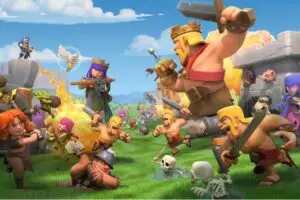Computer games are not just entertainment. Although their benefits are not always noticeable behind the bright design, some games improve attention, memory, reaction speed, logic, management skills, and teamwork.
Many games are aimed at developing thinking and intelligence. Some of them are presented as educational – very often they are collections of puzzles or logical problems.
The authors of Writemyessay.me company have prepared a list of old and new games that help improve skills, train logic, memory, and develop thinking – sometimes unnoticed by yourself.
Physics Puzzles
Contraption Maker
The scientific picture of the world is impossible without knowledge of physics, and physics is hard to learn without experimentation. Trying to learn physics hands-on at home can be disruptive and sometimes dangerous.
Contraption Maker, the successor to The Incredible Machine series, is designed to explore physics. As in the predecessor series, the puzzles are interesting, unconventional, and fun: some problems can be solved with the help of cats or hamsters.
Super Solvers Gizmos and Gadgets
Those who are not afraid of old graphics can play Super Solvers Gizmos and Gadgets.
In this game, you have to solve puzzles in electrical engineering, mechanics, magnetism, and other areas of physics. It’s all about winning 15 races: automotive, aeronautical, and alternative energy. Each successive race in each category is more difficult than the previous one, and so are the challenges.
Spatial reasoning and helping science
FoldIt
Spatial puzzles help develop logic and spatial thinking. Most often these are tasks in which you have to disassemble or assemble the figures from bars of different shapes. The game FoldIt is different from the others. In it, you have to assemble the spatial structure of squirrels according to certain rules.
FoldIt is not just a spatial puzzle game. Those who successfully complete the protein puzzle tutorial can participate in identifying the unknown spatial structures of proteins. So far, humans have done better and faster than specialized programs. That’s why the crowdfunding project FoldIt is helping scientists figure out how proteins are structured.
Monument Valley
Monument Valley and Monument Valley 2 are games for people who like geometry and Escher.
In Monument Valley, you have to find your way out of impossible shapes created by a civilization that considered geometry sacred. A real challenge for spatial thinking.
Innovative Logic
The Black Mirror
Quests as a genre are good trainers for the brain. In these games, you not only need to solve problems with the help of improvised objects and the environment, but also to find them.
Quest series The Black Mirror – detective stories in the genre of mystical horror. The fourth part will interest only the fans of the series: almost all the tasks in it are monotonous and solved by the same tool.
The first part is a classic English detective with lots of logical puzzles, both simple and complex. In the second and third parts of the quests, you play as a sarcastic physics student. Many of the tasks in these games involve the application of physics (and a few times chemistry).
You’ll learn how to develop photos, identify the source of a radio signal, lift concrete slabs, and prepare ammonia. The Black Mirror 2 and 3 quests were definitely made by science fans: almost all of the game’s solutions work in reality. So, following the character, we do not recommend repeating this at home.
Strategies and management skills
Crusader Kings III
Strategic games like chess have been a popular exercise in thinking since antiquity. The development of technology has taken them to the next level.
In Crusader Kings III you will need to manage and expand your empire, fighting off both external threats and internal intrigues. The bigger the state, the bigger the management problems.
Crusader Kings III or its predecessor, Crusader Kings II should have been included in the training of managers, directors, and politicians. These games teach you to think globally and plan decades ahead, sometimes giving up momentary gains.
Creativity
Spore
In Spore, you must choose the size, appearance, and behavior of the creatures you create, from microorganisms to cosmic civilizations. At the same time, you have to defend yourself from attacks from other living creatures, otherwise, natural selection will take its toll.
Evolution in Spore takes place in five stages. The original unicellular creatures live in water and eat plant food, other living organisms, or both. If the cell survives evolution, it will become multicellular, develop a nervous system, and be able to go on land.
The land is occupied by other organisms with which it will have to compete. In the course of evolution, the organism’s brain will increase, and as a result, it will become intelligent and able to create a tribe. From this point on there is a strategic component to the game. You can fight or be friends with other tribes, extract resources, make clothes, and much more.
Gradually the tribe will develop into a civilization based on military art and technology, religion, or trade. The civilization will advance to the next stage when it takes over all the cities on the planet. After that, it will make a spaceship.
The tasks of the last stage of Spore are to explore the galaxy and build colonies. This is an endless stage.
Spore does not simulate the origin of life on Earth, but it does provide a better understanding of the laws of evolution and the workings of natural selection.
Reaction speed and teamwork
Call of Duty
Shooters such as Doom, Wolfenstein, Quake, and the fantasy Heretic develop reaction speed and observation. That’s their point: spot your enemy before he shoots you. Shooters work especially well if you play them in multiplayer mode.
The Call of Duty series is a shooter with multiplayer and cooperative modes. The latter means you can play it team-by-team. This develops not only reaction speed, but also teamwork – the ability to help in time, stay out of the way, and obey commands.
Conclusion
The authors of the cheap essay writing service claim that computer games can be useful for developing intelligence, logical thinking, reaction speed, and many other skills. Some games help scientists in their research. But games, like anything else, require a sense of proportion.






![YouTube SEO in 2024 [Definitive Guide]](https://getpixie.com/wp-content/uploads/2024/02/shutterstock_1684828252-1-150x150.jpg)








